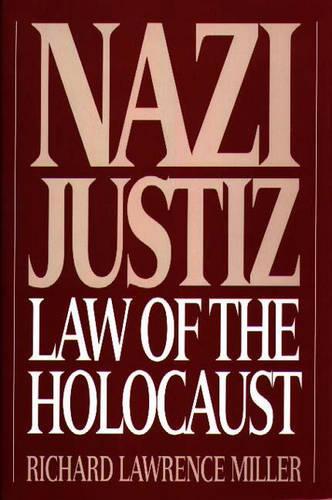
Nazi Justiz: Law of the Holocaust
(Hardback)
Publishing Details
Nazi Justiz: Law of the Holocaust
By (Author) Richard L. Miller
Bloomsbury Publishing PLC
Praeger Publishers Inc
27th June 1995
United States
Classifications
Tertiary Education
Non Fiction
European history
Second World War
Modern warfare
Political oppression and persecution
344.3
Physical Properties
Hardback
248
Description
Using original decrees, court decisions and first-hand recollections of participants, this work documents how the German legal system transformed itself into a criminal organisation. It demonstrates how the legal system shaped everyday life and how the business community benefited from the Holocaust. The text places an emphasis on Germany in the 1930s, before World War II. Such emphasis demonstrates that a Holocaust can happen in any country sharing the heritage of Western civilisation and warns of the inevitable outcome once ordinary people are targeted in a process of destruction. Death camps are the most enduring image of the Holocaust, but they were only the final expression of a destruction process that began in 1933. In that year the Nazi regime mobilised members of an entire society to destroy their neighbours. Lawmakers, judges, attourneys and the rest of the legal system played a crucial role in reassuring "good Germans" that a war on the Jews was legitimate.
Reviews
"How did the citizens of Germany, a decent, fair-minded people, allow themselves to become partners in he most heinous act of genocide in history...Miller contends in his well-researched book this was accomplshed primarily by the systematic implementation of laws that followed a simple formula: "Identify, Ostracize, Confiscate, Concentrate, Annihilate.,."recommended for any student of either history of the darker inclinations of mankind. In this book, Miller illustrates vividly the maxim 'All evil needs to succeed is for good people to do nothing.'""- Tri-City Herald
How did the citizens of Germany, a decent, fair-minded people, allow themselves to become partners in he most heinous act of genocide in history...Miller contends in his well-researched book this was accomplshed primarily by the systematic implementation of laws that followed a simple formula: "Identify, Ostracize, Confiscate, Concentrate, Annihilate.,."recommended for any student of either history of the darker inclinations of mankind. In this book, Miller illustrates vividly the maxim 'All evil needs to succeed is for good people to do nothing.'"- Tri-City Herald
Miller uses a format developed by Holocaust historian Raul Hilberg in The Destruction of the European Jews to describe the Nazi regime's progressively harsher policy towards German Jews from 1933 onward. Miller is especially useful in providing anecdotes and brief illustrations that show the effect of Nazi legal measures on single individuals. The examples of cowardice and venality by Germany's professional classes, professors and physicians especially, are devastating. Miller writes clearly; the book is recommended for upper-division undergraduates through faculty.-Choice
One would wish this book a wide readership....the general reader...will find explanations and insights into a labyrinthian legal system that made it possible to segregate the Jews in Germany, to exploit, impoverish and, at the end, murder them.-The Kansas City Jewish Chronicle
"One would wish this book a wide readership....the general reader...will find explanations and insights into a labyrinthian legal system that made it possible to segregate the Jews in Germany, to exploit, impoverish and, at the end, murder them."-The Kansas City Jewish Chronicle
"Miller uses a format developed by Holocaust historian Raul Hilberg in The Destruction of the European Jews to describe the Nazi regime's progressively harsher policy towards German Jews from 1933 onward. Miller is especially useful in providing anecdotes and brief illustrations that show the effect of Nazi legal measures on single individuals. The examples of cowardice and venality by Germany's professional classes, professors and physicians especially, are devastating. Miller writes clearly; the book is recommended for upper-division undergraduates through faculty."-Choice
Author Bio
RICHARD LAWRENCE MILLER is an independent scholar. He was trained as a broadcaster and historian. He is the author of Truman (1985) and The Case for Legalizing Drugs (Praeger, 1991).
